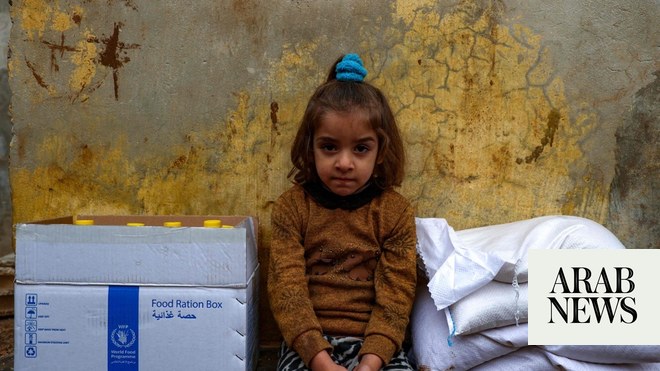
The WFP said it “regrets to announce the end of its general food assistance across Syria in January 2024 due to lack of funding.”
ATME, Syria: Displaced people in camps in northeast Syria have expressed fears about their future after the World Food Programme announced the end of food assistance across the war-torn country.
“Stopping aid to the camps will exponentially increase suffering,” said Ali Farahat, the director of the Maram camp for the displaced in the town of Atme near the border with Turkiye.
“Some have told me ‘if aid stops, we will die of hunger’,” he told AFP on Wednesday.
In a statement issued on Monday, the WFP said it “regrets to announce the end of its general food assistance across Syria in January 2024 due to lack of funding.”
The United Nations’ food aid agency said it would “continue supporting families affected by emergency situations and natural disasters across the country through smaller and more targeted emergency response interventions.”
It told AFP the “decision is based on funding, which is a global issue that WFP faces.”
In September, the WFP had warned that insufficient funds had forced it to reduce assistance in various parts of the world, pushing an estimated 24 million people to the brink of famine.
In July, 45 percent of aid recipients in Syria were cut from assistance, it said.
“WFP’s activities by nature are fully scalable meaning they can be reduced or increased based on needs and available resources,” the agency told AFP.
Around three million people live in areas controlled by the Hayat Tahrir Al-Sham (HTS) militant group in Idlib province.
Roughly half live in camps for the displaced, while others reside in abandoned buildings or caves, or even in old buildings and rusty buses.
Camps for the displaced are often overcrowded and lack basic needs, with residents depending principally on food, medical and other aid provided by international organizations.
Residents of those camps in northeastern Syria, including Maram in Atme, are likely to be the hardest hit by the WFP decision.
Maram’s residents could be seen queuing up to receive some of the last of their aid rations of the year.
“Stopping assistance will lead to the death of those who subsisted on them because they don’t have money to buy food,” said Ahmed Adla, 40, who was displaced 11 years ago from the village of Kurin in Idlib’s countryside.
Khaled Al-Masri, 45, displaced nearly 13 years ago from the nearby village of Hass along with 11 family members, said: “I hope they come to see our conditions and how we spend the winter. We can’t keep our children warm.”












